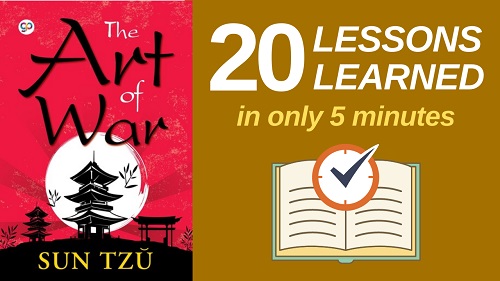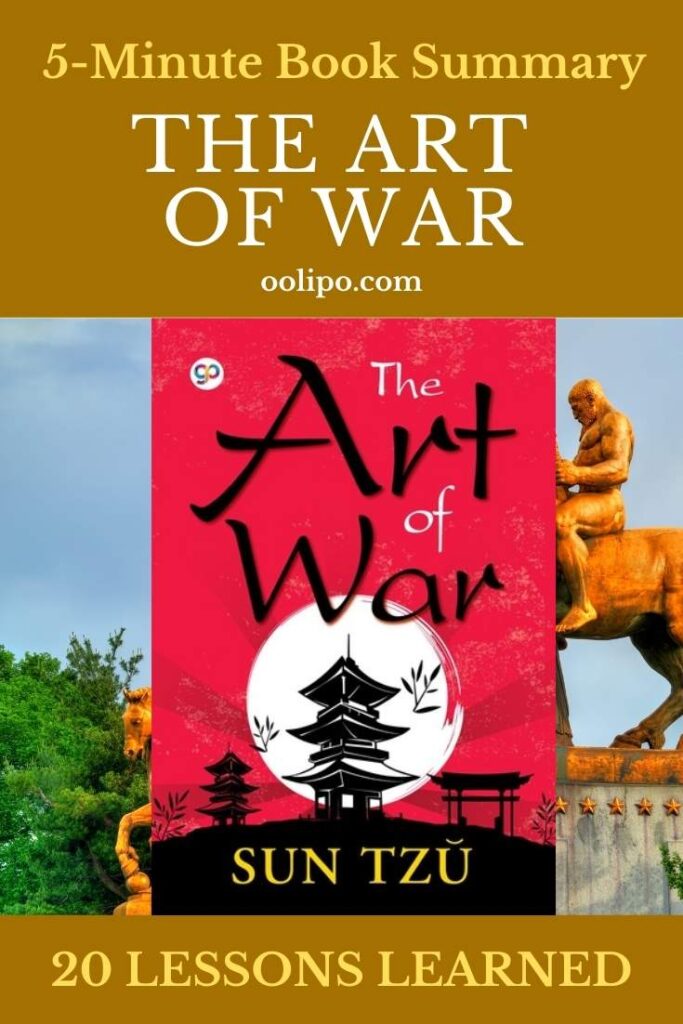The Art of War: Chinese strategist Sun Tzu will help you develop a different perspective and ideas on the war in this book. In this The Art of War summary, we will dive deep into Sun Tzu’s principles of personal development through the lessons learned in the past.
War is not won by brute force alone. That’s why throughout history, we have witnessed the few soldiers overthrow larger armies. For war, we must develop ourselves mentally. You can also adapt the information in the book to your daily life.

The Art of War Summary with 20 Lessons Learned
Here are the 20 lessons to learn from The Art of War Summary:
#1 Unprepared Loses
You have to live and finish the war with every detail in your mind. There should be no room for surprises. During the battle, your time and other resources will be limited. If you don’t know which resource to use for how long, you’re stuck in the middle of nowhere. The party with the plan is strong. The side that has a good plan is the side that is close to victory. Plan the week, the day, the hour, even the minutes.
#2 Creating a Budget
Be aware of how much budget you have for everything from your education to your vacation and how many days or years you can manage with it. Do not try to do a big job by saying that I will find a budget later. It can take a lifetime to compensate for such risks.
#3 Thinking Over and Over
As mentioned earlier in this The Art of War Summary, don’t be lazy thinking. Think again and again about what might happen when you encounter your enemy. Live it over and over in your mind. Repeat this until you have realistically formed the possibilities that will win you over. Trust your abilities, then pursue victory.
#4 Save the Big Goal for Last
Start with small goals first. Even if you want to, you cannot reach the big goal at the beginning of the road. You cannot walk the day you are born. You cannot write poetry the day you learn to write. You will improve yourself day by day. Keeping your big goal in mind, you will move forward with small steps. Knowing that that day will come, but without haste.
#5 Strict Rules
If there is anything as important as strict rules, it is knowing when to bend the rules. The one who adapts wins. When the conditions change, the rules also change. Be the party that sets and enforces the rules. Because you can’t always control the conditions.
#6 Be Unpredictable
Appear so defenseless in the face of the enemy that he will lower all their shields against you. If you are weak, look so strong that the enemy does not want to fight you. For example, teams that underestimate their opponents in sports learned very painful lessons with their first defeat.
#7 You Can’t Win Every Battle
There will be wars that you cannot win, but you do not have to enter those wars. If you know you’re going to lose, choose your strategy accordingly and stay away from battle until you get stronger. Make a deal. Stall to gain time, but don’t engage in a losing battle on purpose.
#8 Timing
In war, in your career, in your relationships, or anywhere else in your life, time is everything. Being in the right place at the right time wins you many battles. It allows you to get ahead of many people. Even if the decision you make is correct, if you choose the wrong time to implement that decision, you will lose.
#9 Your Strengths
It is your strengths that will win you the war. Find these aspects of yourself and develop them until they make you invincible. Let your talents become so sharp that they even help you to cover your other weaknesses. This will be your biggest advantage.
#10 Turn Crisis into Opportunity
If you manage to stay calm even in the worst times, you will come out of the crisis the most profitable. Do not be deceived by those who panic and fear. Every crisis period will pass, but those who set the right strategy in that period continue their lives stronger.
#11 Know Yourself
The better you know yourself, the better your plan will be. Don’t plan on features you’re not sure of. You should realistically reveal these features without deceiving yourself and act accordingly.
#12 Enemies
There is no difference between your enemies or your goals in life. If you want victory in both, you must follow the same roadmap. You must know your enemy and your target very well. You have to learn how to conquer it most easily. What happens next is just following the plan.
#13 Be Mysterious
Once you are confident about your strengths and weaknesses, it’s easy to deceive the enemy about it. What you need to hide is your grand plan. Because if they know what you desire, it will be easier for them to find their weaknesses through it. They don’t hesitate to use their target against you.
#14 First Victory
You just win the war once. You will start to get more support from the people around you and you will see that the number of people who believe in you increases. This way, your next victories will be easier and you will reach your goal sooner than you expected.
#15. Assure
No soldier goes after a commander they don’t trust. Are your words consistent? Do you look strong? Were you able to convey the thought that you would win to your soldiers? If you can achieve these, you can rule a huge army with one word.
#16 Emotions
The greatest enemy is not in front of you but your mind. A soldier who is a prisoner of his feelings becomes a prisoner of the enemy at the end of the war. Act regardless of your feelings. That’s why sticking to the plan is extremely important.
#17 Doubt
If you have the slightest doubt about yourself, your army, or your strength, do not enter that war. Even if you are stronger than your enemy, you cannot make the right decisions when in doubt. This will be your end.
#18 Land Conditions
The one who adapts the most to the terrain conditions from two armies of the same strength wins. If you are far away from your own living space, if you are faced with an unfamiliar climate, it is a matter of time to lose the war. Your soldiers start to run out very quickly mentally.
#19 Being Appreciated
After winning the war, you must earn the admiration of your enemy and the people of that country. Your fight is over. From now on, your rules will apply, but your intervention in their lives may revolt against an exhausted people. You don’t want to deal with people who will attack you with nothing to lose.
#20 Nobody Can Guarantee You Won The War
If you don’t have the slightest doubt about your chances of winning the war, enter that war, but if you have any doubt, look for ways to win without fighting. If you can make a profitable deal, you won the war without a fight. If you have such an opportunity, do not miss it.
Top 10 Quotes from The Art of War
1. “Earth comprises distances, great and small; danger and security; open ground and narrow passes; the chances of life and death.”
2. “When you engage in actual fighting, if victory is long in coming, then men’s weapons will grow dull and their ardor will be damped. If you lay siege to a town, you will exhaust your strength.”
3. “The spot where we intend to fight must not be made known; for then the enemy will have to prepare against a possible attack at several different points; and his forces being thus distributed in many directions, the numbers we shall have to face at any given point will be proportionately few.”
4. “In making tactical dispositions, the highest pitch you can attain is to conceal them; conceal your dispositions, and you will be safe from the prying of the subtlest spies, from the machinations of the wisest brains.”
5. “When in difficult country, do not encamp. In country where high roads intersect, join hands with your allies. Do not linger in dangerously isolated positions. In hemmed-in situations, you must resort to stratagem. In desperate position, you must fight.”
6. “If in the neighborhood of your camp there should be any hilly country, ponds surrounded by aquatic grass, hollow basins filled with reeds, or woods with thick undergrowth, they must be carefully routed out and searched; for these are places where men in ambush or insidious spies are likely to be lurking.”
7. “If soldiers are punished before they have grown attached to you, they will not prove submissive; and, unless submissive, then will be practically useless. If, when the soldiers have become attached to you, punishments are not enforced, they will still be unless.”
8. “When the higher officers are angry and insubordinate, and on meeting the enemy give battle on their own account from a feeling of resentment, before the commander-in-chief can tell whether or no he is in a position to fight, the result is ruin.”
9. “Those who were called skillful leaders of old knew how to drive a wedge between the enemy’s front and rear; to prevent co-operation between his large and small divisions; to hinder the good troops from rescuing the bad, the officers from rallying their men.”
10. “The end and aim of spying in all its five varieties is knowledge of the enemy; and this knowledge can only be derived, in the first instance, from the converted spy. Hence it is essential that the converted spy be treated with the utmost liberality.”
Free PDF Download of The Art of War Summary to Save or Print
We created a PDF file with the summary and quotes on this page for easy access: Download The Art of War PDF Summary. If you want to buy the paperback version of the book, check out this page.
Animated Book Summary
Please share these important lessons by pinning this post to Pinterest.
